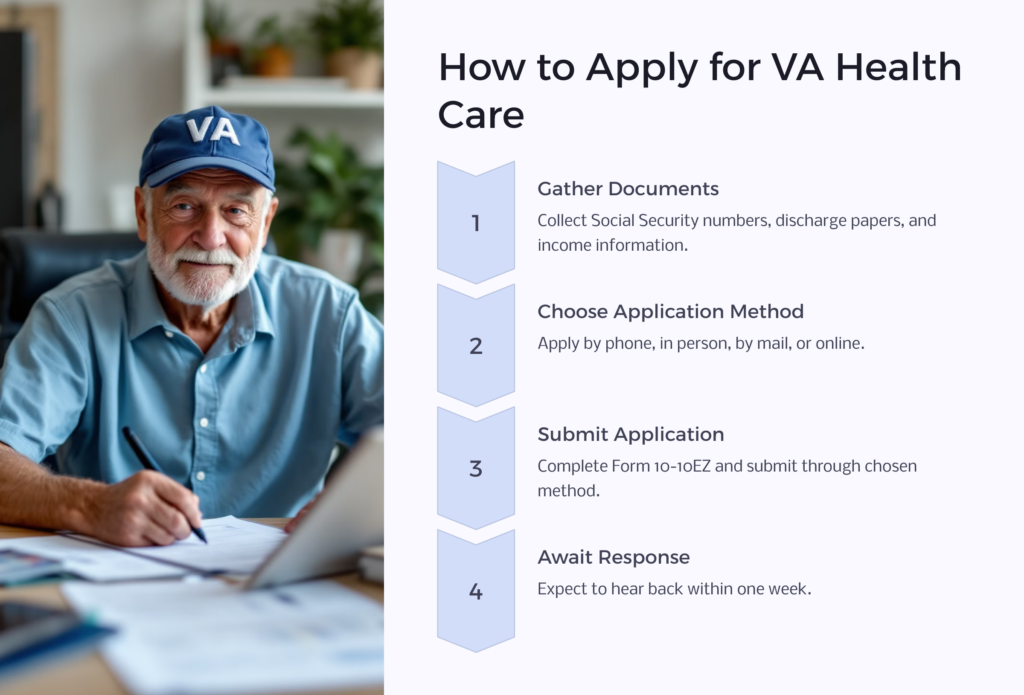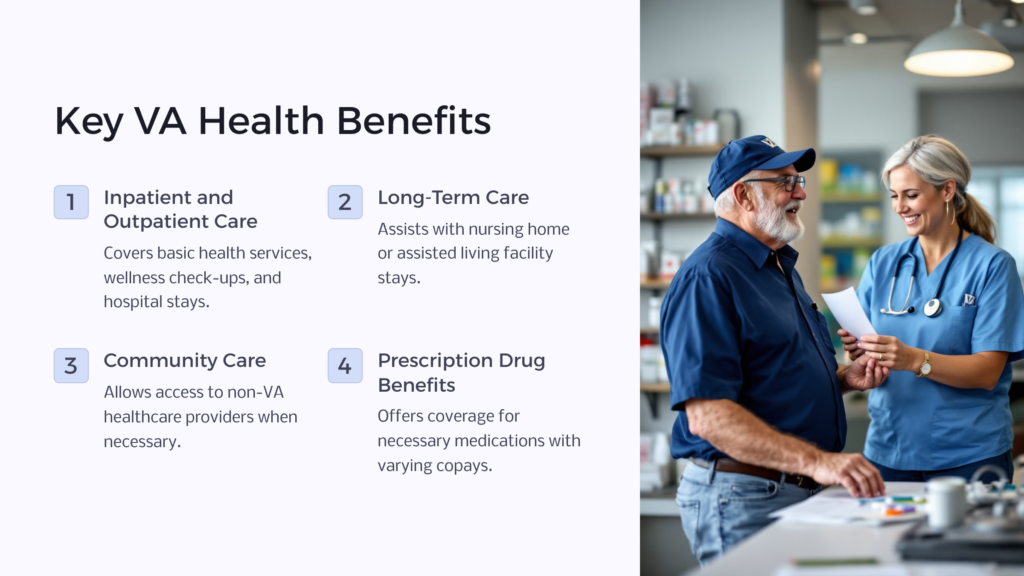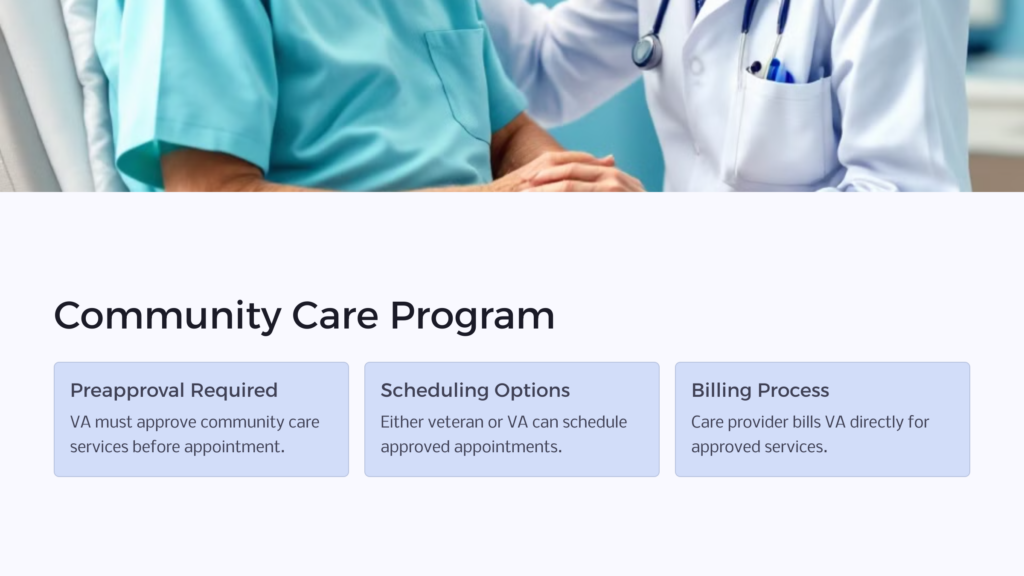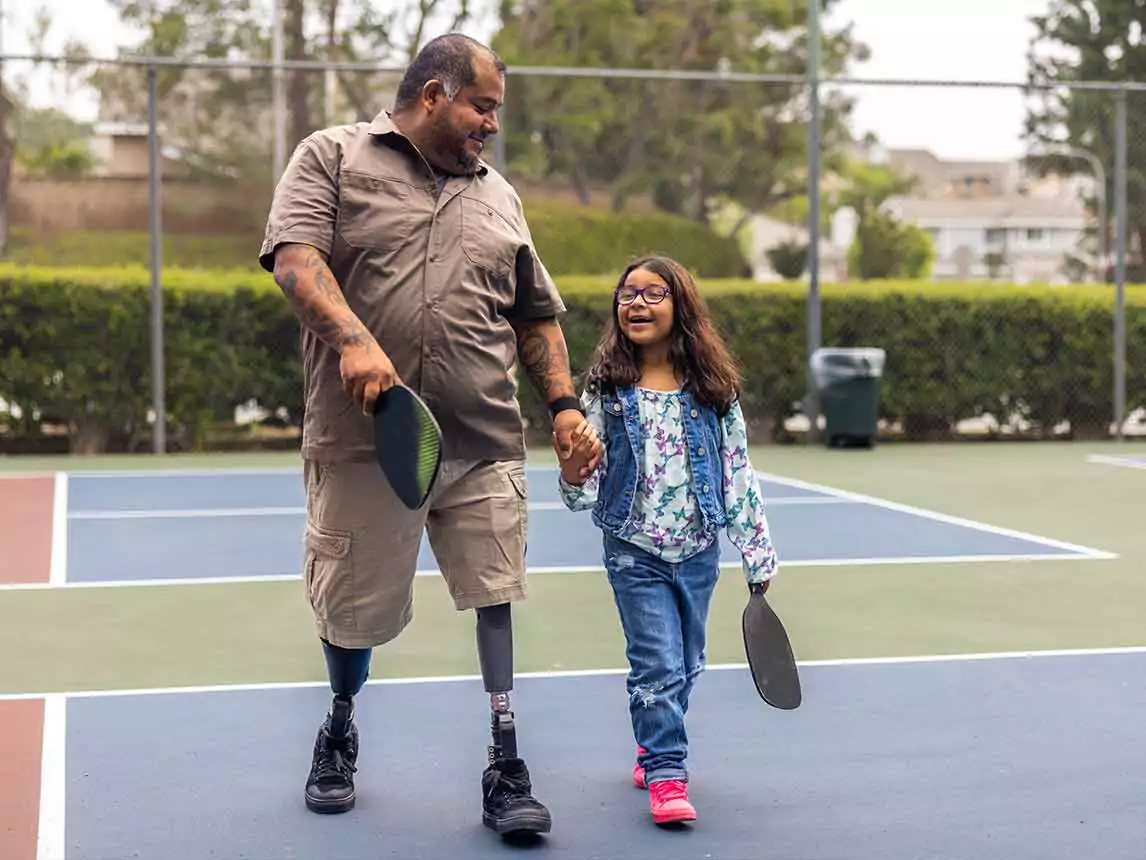
VA health benefits are some of the many benefits offered to military veterans who transition from active-duty service.
These health care benefits vary, depending on the veteran’s health situation and needs, but can include various physical and mental health services through the Department of Veterans Affairs (VA) and community health providers.
7 VA Health Benefits for Veterans
- Inpatient and Outpatient Care
- Long-Term Care
- Community Care
- Prescription Drug Benefits
- Women’s Health Care
- Mental Health Care
- Family and Caregiver Health Benefits
Our nation’s veterans deserve to be taken care of when they leave the service. The VA health care system offers support for veterans’ physical and mental health through several VA health care benefits providing free and affordable health care. Some of these VA health benefits are available at a VA health care facility, while others allow veterans to utilize health services within the community.
From dental care to health insurance to disability compensation, veterans who meet eligibility requirements can receive the healthcare services they need. Families and caregivers may also be eligible to receive medical benefits through specific programs, like CHAMPVA.
How To Qualify for VA Health Care
All veterans benefits have eligibility guidelines that veterans must meet to receive benefits, and VA health benefits are no exception. VA health care benefits are generally reserved for veterans who served in active duty and did not receive a dishonorable discharge from their services.
In some cases, other types of military discharge such as an Other Than Honorable (OTH) or bad conduct discharge may also disqualify a veteran from receiving VA benefits for health care.
Furthermore, eligible veterans must have at least 24 months of continuous service time for their active duty period to receive health coverage through the VA. Some veterans may qualify if they don’t meet this stipulation if they were discharged for a hardship or medical reason before serving that time or if they served before September 7, 1980.
The VA considers some groups of veterans high-priority to determine VA health benefits. A few groups that fall within this classification include former prisoners of war (POWs), those with a VA pension, veterans who qualify for Medicaid benefits, and disabled veterans receiving VA disability benefits. High-priority groups are more likely to get VA health care benefits than those in non-priority groups.
How To Apply for VA Health Care

The VA offers several ways for veterans to apply for health benefits. Veterans may choose to apply by phone, in person at their nearest VA facility, by mail, or through the VA website. Before you apply, be sure to have your family’s Social Security numbers, your military discharge papers, health insurance information, and income information available. If you currently have evidence to support your high-priority status as defined by the VA, have that information available too.
To apply by phone, call the VA hotline at 877-222-8387. When you apply by mail or in person, have VA Form 10-10EZ (Application for Health Benefits) filled out completely, signed, and dated.
Mail your application to:
Health Eligibility Center
2957 Clairmont Rd., Suite 200
Atlanta, GA 30329
Veterans needing assistance with their application can seek the help of a professional accredited representative or Veterans Service Officer (VSO). These professionals can assist you with getting the necessary documents for your application and filling out the application itself. You can search for assistance using eBenefits.
7 VA Health Benefits for Veterans
VA health benefits can often be used alongside Medicare, Medicaid, TRICARE, and private health insurance plans, like those governed by the Affordable Care Act. Here’s an in-depth look at each of the VA’s medical care programs for those who have completed military service.

1. Inpatient and Outpatient Care
Some of the most commonly used VA health benefits are those involving inpatient and outpatient care. This program covers basic health services that allow veterans to get the health care they need to prevent, diagnose, and treat health issues. VA benefits may pay for regular wellness check-ups, doctor visits for illness or injury, and outpatient services. The focus of these services is to maintain or improve a veteran’s quality of living.
The coverage also covers many inpatient services, including hospital stays for injuries or illnesses, surgeries and recovery time, and specialized care for physical or mental health problems.
Emergency care and urgent care visits may also be covered. However, inpatient and outpatient care are usually only available through a VA provider and VA health care facility unless the VA approves a different provider.
In addition to basic and emergency care health services, the VA can cover medical testing and blood work used to diagnose or monitor health issues. Cancer treatments, physical therapy, and medical devices can also fall under covered services.
Military veterans can use their benefits to cover annual vision checkups and, if eligible, necessary dental services.
2. Long-Term Care
Some military veterans may need long-term care at a nursing home or assisted living facility due to a service-connected disability, injury, or illness.
The VA will help pay for eligible stays at long-term care facilities and other qualifying locations, like the veteran’s home or a private home with a caregiver. Covered services may include the veteran’s basic care, tests, pain management, and physical therapy.
To be eligible for these services, the veteran must be enrolled in VA health benefits, and the VA must determine that the long-term care services are necessary for the veteran’s well-being and health. Veterans who live a long distance from a VA health care facility can still receive these health benefits, but they may need to check in with a VA care coordinator occasionally to determine the best course of care.
3. Community Care

Community care refers to health care services provided at a community outpatient clinic, medical office, or another facility that isn’t part of the VA healthcare system.
A VA medical center can provide not all health care services, and some veterans may not live within a decent range from one. Therefore, the VA sometimes gives preapprovals for veterans to seek health care from a community care provider.
To use the community care system through the VA, the veteran must first seek approval. Then, either the veteran or the VA will schedule an appointment with the care provider for the veteran.
After the appointment, the care provider will bill the VA for the approved services. If any services are conducted outside of the VA’s approval, the veteran may be responsible for uncovered costs. Some services may also have a copay, even if the VA approves them.
To be eligible to receive health care services from a community care facility or hospital, the veteran must already be enrolled in VA health care. In most cases, the VA will need to review a veteran’s medical file to determine whether the requested services are necessary.
4. Prescription Drug Benefits

Medicare, Medicaid, and private healthcare providers do not always cover prescription drugs, and a veteran may still be responsible for a hefty copay with some prescriptions. One of the most helpful VA health benefits is prescription drug coverage, which saves veterans from paying hefty out-of-pocket fees for their necessary medications.
Veteran copays vary depending on their priority group. Those listed in priority group 1 by the VA do not pay copays. This group includes veterans who have received a Medal of Honor, have a service-connected disability that renders them unable to work, or have a 50% or more disability rating.
Beginning with priority group 2, veterans will have some copays, although the lower groups, 3-8, generally pay more in copays than high-priority groups. Copays for inpatient and long-term care services can also vary.
Veterans may track, refill, and manage their prescriptions through the VA’s online service. This service allows convenient online medication refills and delivery tracking, saving the veteran from making trips to the pharmacy. Email alerts can also keep veterans up-to-date on their medications. Veterans can create an account for free.
5. Women’s Health Care
Women veterans can get specific VA health care benefits related to their unique needs. In addition to providing care for general medical services as other veterans also get, women veterans can receive breast and cervical cancer screens, birth control, menopausal support, and urinary incontinence.
The VA also provides healthcare for women in need of mental health services, nutrition counseling, diabetes support and counseling, substance abuse problems, and military sexual trauma (MST). The VA may also cover maternity care and reproductive health management.
To be eligible for women’s health care services through the VA, women veterans must first be enrolled in VA health care. VA medical centers have a Women Veterans Program Manager available to consult with veterans about their care, provide referrals, and coordinate care. The Women Veterans Call Center is also available by phone or online chat to help women get more information about their covered care.
The VA offers a Women Veterans Health Care website with information specific to women’s health care needs and covered services.
6. Mental Health Care
A crucial part of VA health benefits is mental health support for veterans. The VA does not take mental health lightly, committing to supporting veterans who live with conditions such as substance abuse, sexual trauma, anxiety, depression, and suicidal thoughts.
Veterans already enrolled in the VA health care system can take advantage of the VA’s resources and services. Benefits vary depending on the type of mental health condition a veteran has.
For instance, substance abuse patients can receive outpatient counseling, residential care, and safe detoxifying services. Veterans with posttraumatic stress disorder (PTSD) can use the VA’s online PTSD tool for information and guidance or connect with an approved PTSD program for more help.
InTransition is a program veterans can use to improve their lives after leaving the military to prevent mental health problems that may arise from the drastic life change. The program assigns a personal coach to the veteran who can assist them through the process and coordinate resources as needed.
Veterans without VA health benefits may still be able to receive mental health support from the VA. The VA offers free mental health support for one year after a veteran leaves the service, and a combat veteran may receive mental health screenings through the VA health care system.
7. Family and Caregiver Health Benefits

The VA takes care of veterans’ families and their health, too. A family caregiver, dependent, or surviving spouse of a veteran may qualify to receive VA health benefits through several programs, such as TRICARE and The Civilian Health and Medical Program of the Department of Veterans Affairs (CHAMPVA).
TRICARE offers complete health coverage for a deceased service member’s family if the service member died while on active duty or received a Medal of Honor. This program covers routine medical visits and check-ups, prescription drugs, dental health services, and more.
CHAMPVA, while not as comprehensive as TRICARE, can help family members of a veteran who has passed or is disabled receive some assistance paying for health care.
To qualify for enrollment, the veteran must be rated as totally and permanently disabled by the VA or has died from a service-connected disability or in the line of duty. CHAMPVA covers specific services, like mental health care services, family planning, and maternity, and prescription drug services.
Other programs to support the families of veterans include The Camp Lejeune Family Member Program, The Children of Women Vietnam Veterans Health Care Benefits Program, and The Program of Comprehensive Assistance for Family Caregivers.
Getting VA Health Benefits
VA health benefits can have a positive impact on your health as a veteran. Your status has earned you these benefits to assist you now and in the future. Families of veterans can also receive health care coverage through the VA and VA healthcare system, ensuring that the loved ones of military veterans are also taken care of.
Once you apply for VA health benefits, expect to hear back from the VA within one week regarding your application.
In some cases, the process may take a bit longer, but you can call the VA hotline at 877-222-8387, Monday through Friday, to check on its status. To speed up the process, make sure you send all required documentation and fill out the form in its entirety before mailing it or bringing it to a VA facility in person. You can always contact the VA or a VSO for more information about health care programs, eligibility, and additional benefits.
 Benefits.com Advisors
Benefits.com Advisors
With expertise spanning local, state, and federal benefit programs, our team is dedicated to guiding individuals towards the perfect program tailored to their unique circumstances.
Rise to the top with Peak Benefits!
Join our Peak Benefits Newsletter for the latest news, resources, and offers on all things government benefits.





















